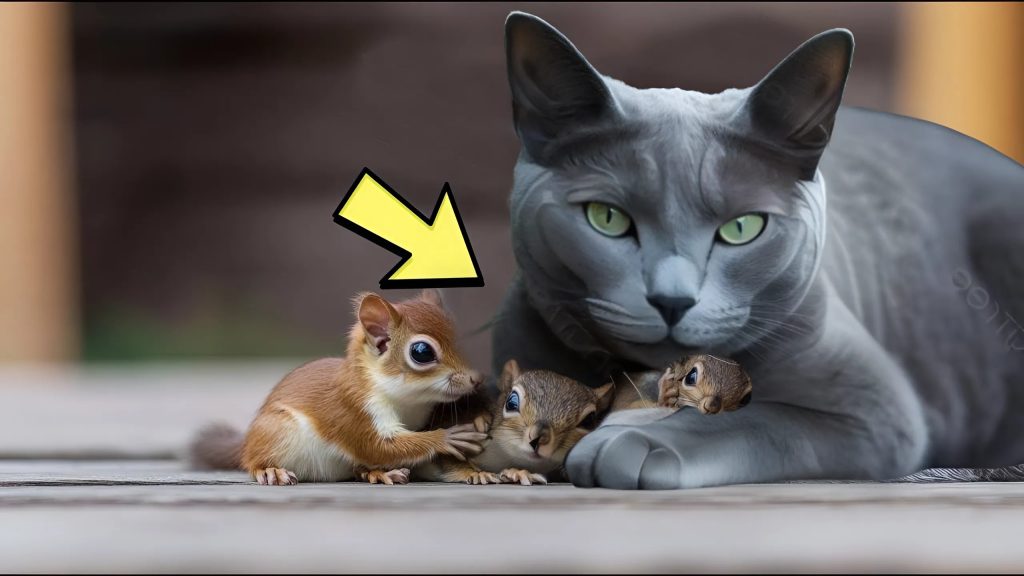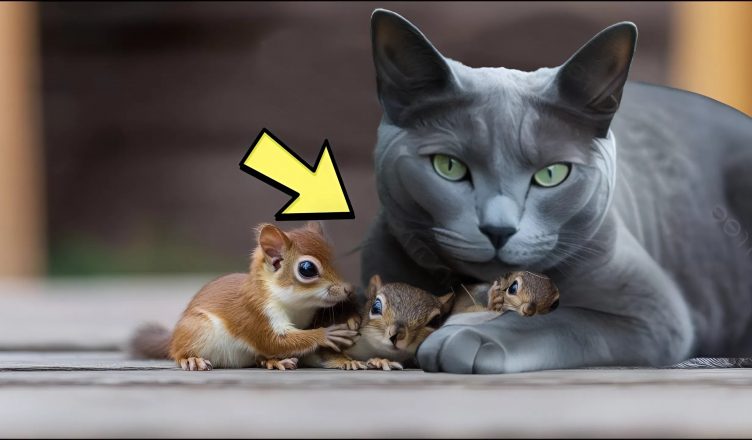In a quiet village nestled on the edge of a vast forest, something extraordinary unfolded—an event that not only touched hearts but also challenged the boundaries of instinct and identity. A domestic cat, soft-furred and calm-eyed, stepped into a role no one expected: that of a foster mother to four orphaned baby squirrels. This tale, simple yet profound, carries a weight of meaning in an increasingly disconnected world. It is a story of empathy, adaptation, and the quiet heroism found in the most unexpected creatures.
A Mother’s Instinct Knows No Species
Masha, a five-year-old tabby cat, had always been known in her neighborhood for her tranquil demeanor and nurturing personality. Living in the home of an elderly woman named Galina, Masha led a comfortable life. She roamed the garden freely, chased the occasional butterfly, and spent long hours sunbathing near the porch. Her life was peaceful, even uneventful—until one spring afternoon when the tranquility was disrupted by a faint, high-pitched chirping.
Galina, who often took walks in the forest surrounding the village, had come across a hollow tree that had fallen after a recent storm. Inside were four tiny squirrels, eyes still closed, shivering and alone. Their mother was nowhere to be found. It was likely she had perished or been scared off during the storm. Unable to leave them to die, Galina gently collected the fragile creatures and brought them home, unsure of what to do next.
Enter Masha.
The Unlikely Bond
When Galina placed the baby squirrels in a soft blanket on the kitchen floor, Masha was immediately drawn to them. At first, it was cautious curiosity—sniffing them, circling them—but within minutes, something extraordinary happened. Masha lay down beside the helpless creatures and began to lick them, as a mother would her own kittens. Her purring was soft, rhythmic, and comforting. It was as if a switch had flipped inside her—a dormant maternal instinct awakened in the presence of need.
From that moment on, Masha refused to leave the squirrels. She warmed them with her body, nudged them when they whimpered, and even allowed them to suckle, though she had no milk to give. Remarkably, her body began to change. As has been documented in rare cases among mammals, hormonal shifts triggered by maternal behavior led to the production of a small amount of milk—just enough to sustain the babies until Galina could supplement their diet with formula.
What followed was nothing short of miraculous.
Survival Through Love
Under Masha’s care, the squirrels thrived. Their fur thickened, their eyes opened, and their tiny paws grew stronger. Masha was patient with them as they clumsily crawled over her back, tugged at her whiskers, and squeaked for attention. As they grew, she taught them the feline equivalent of grooming and discipline. Though they would never be cats, they absorbed the lessons of social behavior through this unique cross-species upbringing.

Galina watched in awe. She documented the experience daily, sharing it with neighbors and, eventually, local wildlife experts. Videos and photos of Masha curled up with her squirrel babies began circulating online, gaining traction for their sheer emotional pull. People from around the world were captivated by the story—a reminder that maternal love can defy biology.
Viral for a Reason
In a digital age oversaturated with trivial content, it is rare for a story to go viral for its depth of meaning rather than its novelty. Masha’s tale resonated because it stood in stark contrast to the cynicism and detachment that pervade much of modern life. At its core, it reminded us of something primal and enduring: that compassion is not exclusive to humans, and that sometimes, the most profound acts of care come from those least expected to give it.
The story also tapped into a collective longing for unity, for examples of harmony in a world divided by conflict and speciesism. Masha did not see the squirrels as “other.” She saw only vulnerability and responded with care. That instinctual empathy, untouched by prejudice or rationalization, became a beacon of hope.
A Broader Lesson
Biologists and ethologists who studied the case later commented on the phenomenon of interspecies adoption. While it is rare, it is not unheard of. Instances of dogs raising kittens, goats mothering lambs, and even dolphins protecting humans have all been recorded. What makes these occurrences so compelling is their defiance of nature’s rigid rules. These are anomalies, but they are also revelations.
Masha’s story serves as a powerful metaphor. In times of crisis, the lines that separate us—species, race, class, belief—can blur. Survival often depends not on strength or sameness, but on the willingness to connect, to nurture, and to protect. The motherless squirrels did not need a cat. They needed a mother. And Masha, guided by a heart larger than her size, steppe
